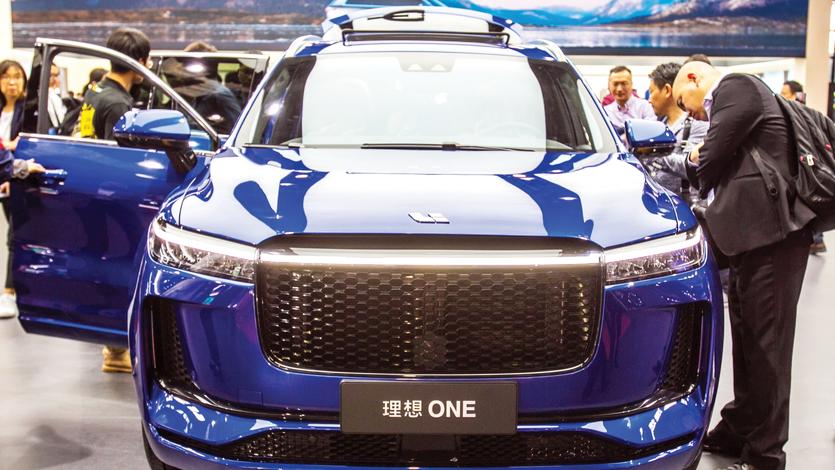Carbon goals aided by expansion of world's biggest market for green cars
 Visitors check out a Li Auto electric car during an automobile exhibition in Shanghai. (PHOTO PROVIDED TO CHINA DAILY)
Visitors check out a Li Auto electric car during an automobile exhibition in Shanghai. (PHOTO PROVIDED TO CHINA DAILY)
Editor's Note: As delegates try to reach a meaningful agreement at the COP 26 climate summit in Glasgow, Scotland, calls are growing for concrete action to combat global warming.
Chinese consumers' readiness to switch to electric vehicles will help the government achieve the goal of reducing emissions under its strategy to combat climate change, experts say.
China has become the world's biggest market for EVs, accounting for 40.5 percent of the 3.17 million such vehicles sold worldwide last year. The Chinese sales of nearly 1.29 million units in 2020 represented an increase of 8.3 percent year-on-year, according to data from the International Energy Agency.
The Chinese government has vowed that CO2 emissions will peak before 2030 and that the country will reach carbon neutrality by 2060.
The energy agency forecasts that China will continue to expand its share of the global EV market, with annual sales projected to exceed 9.6 million units in 2030.
Bakar Sadik Agwan, an automotive analyst at London-based data and analytics company GlobalData, said: "Automotive is a key part of China's manufacturing industry-a key contributor to carbon emissions at the moment.
"The China auto industry has been a global leader in the transition to EVs and will continue to grow in the long term. Aiming for carbon neutrality across the automotive manufacturing process is a step in the right direction."
Gavin Harper, a research fellow at the Faraday Institution at the University of Birmingham in the UK, said: "Chinese leaders have had the foresight to support the industry to produce EVs and create incentives and policy that have catalyzed the domestic market for EVs."
Harper, who is carrying out work in the field of future energy systems, believes the government's actions have encouraged companies in the sector and hastened their progress on the learning curve.
A recent report by DataTrek Research said China remains on track for 25 percent of all vehicle sales to be electric by 2025, and indicated it is well ahead of the United States and Europe on EV infrastructure.
Environment nurtured
Tu Le, founder of consultancy Sino Auto Insights, said that because the Chinese government had nurtured the EV market for over a decade, it has fostered an environment in which the private sector can expand.
The US giant in the sector, Tesla, has also played a role in the development of the industry in China, he added. "Tesla should be given a decent amount of credit as well since they came early and partly inspired companies like NIO, XPeng, WM, Li Auto to try to be difference-makers in the space," Tu said.
Those companies have launched many viable products that compete directly with traditional vehicles for the consumer's attention.
China is now considering replacing its current green car credit system with a broader approach to reduce carbon emissions.
In July, China launched its long-awaited national carbon emissions trading market, demonstrating the country's commitment to decarbonization. But the automobile industry is currently not required to trade carbon emissions, with trading getting underway first with power-generation companies.
The introduction of the emissions trading scheme, or ETS, is expected to help China meet its goals under the Paris Agreement and achieve the 2060 carbon neutrality target, while creating a sustainable EV industry, said Agwan.
Under the green car credit system, active until 2023, carmakers are credited points for selling electric or fuel-efficient vehicles. The credits can be traded to other companies to earn additional revenues and offset the penalties on more carbon-intensive models.
The ETS is based on the "cap and trade" principle, in which a cap is set on the total amount of certain greenhouse gases that can be emitted by sectors covered by the scheme. Within this cap, companies receive free allowances and can buy or sell emission allowances with other participants as needed.
"Covering the electricity sector which is responsible for roughly 40 percent of China's total emissions, the launch of China's ETS marks a significant step toward the country's carbon neutrality pledge," said Xie Chunping, policy fellow at the London School of Economics and Political Science.
"As China's power sector continues to decarbonize, switching to EVs will play an increasingly important role in helping the country to achieve its 2030/2060 climate goals," she said.
wangmingjie@mail.chinadailyuk.com


